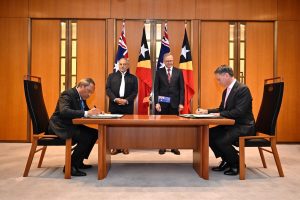In October, Timor-Leste is set to become the 11th member of the Association of Southeast Asian Nations (ASEAN), the most consequential regional grouping to Australia’s north. For the first time ever, Canberra will have two ASEAN neighbors. Within the bloc, Indonesia has been the biggest supporter of Timor-Leste’s application to join ASEAN. Australia too has been an important supporter of Dili’s desire to join the grouping.
Good relations with both Timor-Leste and Indonesia are both a strategic and diplomatic imperative for Australia. This is especially the case since regional cohesion falters under the weight of U.S.-China strategic competition and security challenges such as the Myanmar civil war and the Thailand-Cambodia border conflict. Closer communication, consultation and cooperation between Australia and its Southeast Asian neighbors is an investment in our shared future
Timor-Leste’s accession is an ideal moment for the Albanese government to build momentum for the elevation of the Australia-Indonesia-Timor-Leste trilateral partnership, from the foreign minister to the leadership level.
As part of such an arrangement, annual trilateral leaders’ and ministerial-level summits should be held, in line with the Indonesia-Australia Comprehensive Strategic Partnership (CSP), which aims to increase and strengthen trilateral meetings between Indonesia, Australia, and Timor-Leste.
The trilateral meetings could focus on areas of shared interests and challenges like border security, defense infrastructure and maritime security. For instance, they could together increase their maritime security capabilities by running regular maritime patrols, holding annual joint military exercises, training, and naval port visits. Joint maritime training and patrols would be particularly beneficial for Timor-Leste’s tiny navy, which continues to struggle combating illegal, unreported and unregulated fishing in its maritime waters. The country losses approximately $300 million per year due to illegal fishing in the Timor Sea.
The 2022 Australia-Timor-Leste Reciprocal Defense Cooperation Agreement tries to address these security challenges, by increasing bilateral security cooperation, especially in the maritime domain. As part of the deal, Timorese defense personnel operating or training in Australia will receive the same protections, responsibilities, and privileges as Australian personnel will receive in Timor-Leste. In 2023, Australia committed to donating two Guardian-class patrol boats to Timor-Leste by 2024. Nonetheless, the Timor-Leste navy is yet to receive the vessels due to the inadequate condition of the Port Hera Naval base.
Ironically, Timor-Leste was the central factor in the significant decline of Australia-Indonesia bilateral relations in the second half of the 1990s. The 1995 Australia-Indonesia security agreement was torn up by Indonesia in 1999 after the Australian-led multinational invention in East Timor, which had been an Indonesian province since its forcible incorporation in 1976. This marked an all-time low in the bilateral relationship, but in the years since it has been able to recover from this setback and has matured over time.
In the 2006 Lombok treaty, Jakarta and Canberra recognized each other’s territorial integrity, and they upgraded their strategic ties to a CSP in 2018. Under the new Australia-Indonesia Defense Cooperation Agreement, the two neighbors have pledged to ramp up joint military exercises and training to unprecedented levels and allow both nations to operate from each other’s countries for mutually determined cooperative activities.
Since its independence in 2002, Timor-Leste has taken a realist foreign policy approach. The key priorities of Timorese foreign policy have included campaigning for full ASEAN membership and ensuring strong ties with its two large neighbors, Australia and Indonesia.
Today, Timor-Leste enjoys cordial relations with Indonesia, its largest trading partner. Citizens of Timor-Leste also have visa-free access in Indonesia. No doubt, without the crucial support of Indonesia, Dili’s aspiration of becoming an ASEAN member would have been virtually impossible.
The Indonesian National Armed Forces also provide military education and training to personnel from the Timor-Leste Defense Force. The neighbors maintain a joint border security task force, which often conducts joint border patrols along the Indonesia-Timor-Leste border. They’ve also resolved and determined most of their land boundaries. While the region of Naktuka remains a disputed border area, Timor-Leste’s Prime Minister Xanana Gusmao recently stated that the two nations are “working together to resolve the dispute in accordance with international law.”
Subsequently, the deepening of bilateral ties between the three neighbors sets solid foundations for a high-level trilateral. It would also realize the full potential in existing trilateral ties.
The trilateral partnership should also reaffirm ASEAN’s “centrality “in the Indo-Pacific. Australian foreign policy sees ASEAN at the center of a peaceful, stable and prosperous region, where sovereignty is respected, and all countries benefit from strategic balance.
In 1974, Australia became the grouping’s first dialogue partner. Since its humble beginnings over 50 years ago, the ASEAN-Australia partnership has gained in strength. In 2010, the ASEAN-Australia-New Zealand Free Trade Agreement came into effect. And, in 2021, the ASEAN-Australia relationship was elevated to a Strategic Comprehensive Partnership.
Overall, Australia prioritizes a strong relationship with Southeast Asia and its northern neighbors. In Indonesia and Timor-Leste, Australia will very soon have two ASEAN countries right on its doorstep. Amid growing unpredictability in the region, now is the time for Australia to seek a high-level trilateral with its two important neighbors.

































